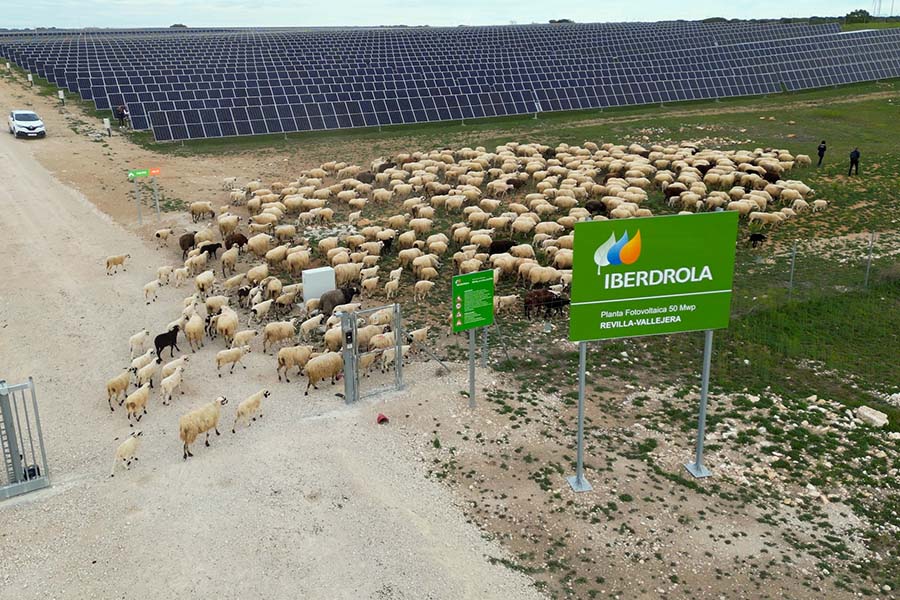UNEF awards the Seal of Excellence in Sustainability to the first photovoltaic project from Iberdrola España in Castilla y León
-
The 50 MW Revilla-Vallejera plant in Burgos produces enough clean energy to supply a population equivalent to 26,000 households/year and prevents the emission of 12,300 tonnes of CO2/year.
-
In collaboration with the mushroom and fungi producer Fungi Natur, Iberdrola España has launched the first project in Spain to grow mushrooms in photovoltaic plants. This project makes it possible to take advantage of the countryside and the shade of the panels to promote local work and the development of agriculture, while saving water and improving the quality of the harvest. In addition, 600 sheep graze daily on the site of this plant.

The Revilla-Vallejera photovoltaic plant in Burgos – Iberdrola España's first photovoltaic project in Castile and León – has been awarded the UNEF Seal of Excellence in Sustainability, which recognises ground-mounted solar power plants that meet the highest criteria for social and environmental integration.
This is the fifth Iberdrola España project to achieve this certification, for which an independent audit was carried out by the company SGS, which assessed socioeconomic parameters, preservation and restoration of biodiversity and circular economy – which respond to the company's commitment to economic, social and environmental sustainability. Llanos Pelaos in Fuerteventura, Olmedilla in Cuenca, Campo Arañuelo III in Cáceres and Andévalo in Huelva are the Iberdrola España photovoltaic facilities that have already received this certificate.
The Seal of Excellence in Sustainability, created by the Spanish Photovoltaic Union (UNE) in 2020 to disseminate the good practices of the Spanish photovoltaic sector, reinforces its commitment to a sustainable energy transition. Continuing with this work, UNEF has become the first entity worldwide to design its own system for certifying the sustainability of photovoltaic installations, aimed at all companies that may be interested in obtaining it; whether they are developers, builders or owners.
Consuelo Álvarez, Head of Regulation at Iberdrola Energía Sostenible España, stressed that "seals such as this one, for which we are very grateful, give us the impetus to continue making our facilities true places where social, environmental and territorial coexistence is possible. Iberdrola España has been working for years within the Convive Programme on a multitude of initiatives to promote these good practices".
"These projects demonstrate that there is no source of energy generation more integrated with the territory, biodiversity and citizens than solar energy. We are convinced that, thanks to the existence of this pioneering certification, what seems to be the exception will become the norm in the national photovoltaic sector. In the coming years, we are confident that all ground-mounted solar energy projects will have and will see their excellent standards of social and environmental integration recognised", stressed UNEF's General Director, José Donoso.
About the photovoltaic plant Revilla-Vallejera
In May 2022, Iberdrola España commissioned its first photovoltaic project in Castile and León – Revilla-Vallejera – reinforcing its innovative and renewable leadership in the region, where it already operates more than 5,150 MW, making it the autonomous community with the most 'green' megawatts installed by the company.
The Revilla-Vallejera plant, which has a capacity of 50 MW, is located in the Burgos municipality of the same name and its evacuation line crosses the municipalities of Villamedianilla and Vallejera. It generates enough clean energy to supply a population equivalent to 26,000 homes/year, avoids the emission into the atmosphere of 12,300 tonnes of CO2 per year and represents an investment of €32M.
Its construction has had an important local component, both in terms of industrial suppliers and the involvement of up to 250 workers during peak periods.
Coexistence of nature and renewable energies
Iberdrola España works on numerous initiatives that combine the installation of renewable projects with the conservation of the biological diversity of ecosystems, caring for flora, fauna and natural heritage. The coexistence of these renewable generation plants with activities related to agriculture, livestock farming and horticulture are further proof of the company's commitment to preserving biodiversity.
In collaboration with the mushroom and fungi producer Fungi Natur, Iberdrola set up the first project in Spain to grow mushrooms in photovoltaic installations at this plant in Burgos a few months ago. This project makes it possible to take advantage of the countryside and the shade of the panels to promote local work and the development of agriculture, while saving water and improving the quality of the harvest.
In addition, 600 sheep graze daily in the enclosure of this facility – a clear example of circular economy. "Solar grazing" benefits the farmers, who gain new spaces for their activity; it is positive for the plant, as it ensures the ecological maintenance of the land and reduces the risk of fires; and it benefits the animals who, in addition to access to food, find protection from the sun, rain and wind in the solar panels.
"Revilla Vallejera City Council has been one of the winners of the first edition of the Iberdrola Convive Awards. This municipality in the province of Burgos has been on the renewable energy map since 2016 and is an example of how small towns not only coexist with green energy, but also complement and benefit from it", said the Head of Regulation at Iberdrola Energía Sostenible España.











